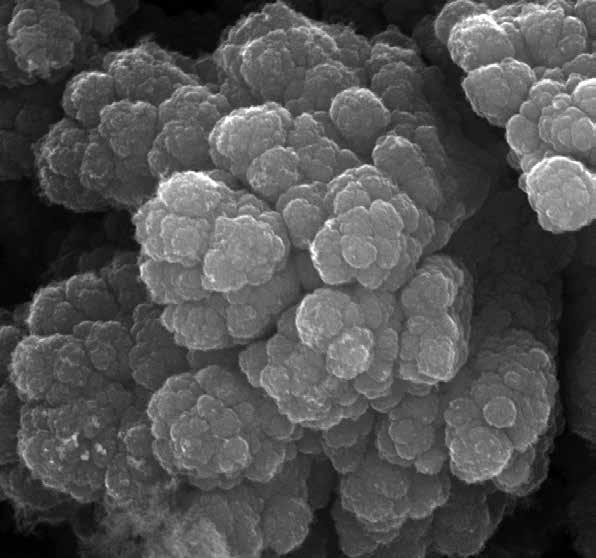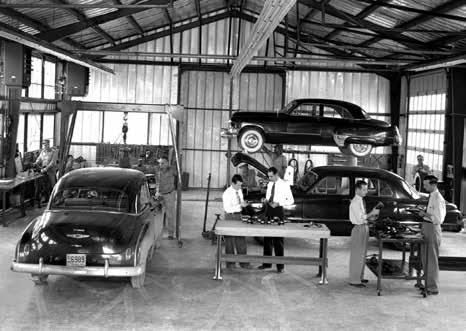
3 minute read
SwRI, UT Austin Launch “Energize” Initiatives
SwRI and The University of Texas at Austin have funded five research projects through the Energize Program, a new opportunity for enhanced scientific collaboration between the two institutions.
“I have no doubt that with the combined capabilities and expertise of SwRI and UT Austin, these projects will have a strong, positive impact on some of our greatest challenges in the energy sector,” said SwRI Executive Vice President and COO Walt Downing.
The Energize Program includes two funding opportunities. The first, overseen by UT's Energy Institute, funds projects in any energy field with a focus on decarbonization. The second, run by UT's Hildebrand Department of Petroleum and Geosystems Engineering, funds projects in any field of energy-related research, including oil and gas, renewable resources, hydrogen, carbon storage and geothermal energy. All projects include at least one principal investigator from each institution.
The Energy Institute has selected three projects. Each will receive $75,000 per year for two years from SwRI and a total of $60,000 from UT Austin.
• In the first project, SwRI Senior Research Engineer Ellen Smith and UT Austin’s Dr. David Bogard seek to develop and evaluate an enhanced turbine cooling method to facilitate cleaner hydrogen-fueled engine applications. Hydrogen fuel exhaust is free from carbon byproducts. However, hydrogen combustion requires higher temperatures, resulting in higher heat transfer. Smith and Bogard will use additive manufacturing to design and build a turbine strut with advanced cooling technologies to enable high-temperature operations. The design will incorporate film cooling configurations recently developed at UT Austin and will be tested in the hydrogen burning combustor facility at SwRI.
• SwRI Principal Scientist Dr. Jianliang Lin is collaborating with Dr. Alex Hanson and Dr. Jean Anne Incorvia, both of UT Austin’s Cockrell School of Engineering, to create reliable and affordable magnetized chip technology for next-generation energy technologies. Many climate-relevant next-generation technologies — data center power delivery, grid-scale smart transformers, advanced solar and battery management systems and internet-of-things applications — require expensive components, impeding large-scale adoption. Magnetic chips are very energy-efficient. However, integrating the magnetic components can be challenging and costly. The team will develop a large-scale rapid coating deposition technology for synthesizing high-quality and affordable magnetic materials for wide application.
• SwRI’s Dr. Michael Miller will work with UT Austin professors Dr. Thomas C. Underwood, Dr. Fabrizio Bisetti, Dr. Graeme Henkelman, and Dr. Charles Mullins to create a cost-effective and environmentally friendly method for producing hydrogen fuel. Although hydrogen could help decarbonize transportation, power generation and manufacturing, conventional industrial hydrogen production from natural gas creates significant greenhouse gas emissions. The team is investigating a plasma-enabled catalytic process to eliminate carbon monoxide and carbon dioxide emissions, converting methane directly into hydrogen and solid carbon at near-ambient temperatures and atmospheric pressures. The project will build on current and previous studies of plasma-enabled chemical processes and catalysis at both SwRI and UT Austin.
The Hildebrand Department of Petroleum and Geosystems Engineering has selected two projects, each to be supported by $75,000 from UT Austin and $75,000 from SwRI.
• SwRI’s Angel Wileman and Sarah Stuart are collaborating with UT Austin professors Dr. David DiCarlo and Dr. Masa Prodanovic to study using CO2 foams to improve long-term carbon storage. Capturing carbon emissions and storing them in depleted oil and gas wells is a viable method for reducing atmospheric carbon. The challenge is making sure stored CO2 does not leach out of the reservoir into the air. The researchers will leverage traditional CO2-enhanced oil recovery methods to investigate the stability and behavior of foam-entrapped CO2 in high-temperature and high-pressure reservoir conditions.
• SwRI’s Kevin Supak, Dr. Jordan Nielson and Kelsi Katcher will work with UT Austin’s Dr. Yingda Lu to study CO2 pipeline flow behaviors as part of a larger effort to facilitate large-scale carbon capture utilization and storage (CCUS). Before CCUS technology can reach its potential for reducing harmful CO2 emissions, a cost-effective method for transporting large quantities of CO2 is needed. To facilitate the design and operation of large-scale CCUS transportation systems, the project team will investigate the flow behaviors of CO2 under typical pipeline transportation conditions. The project utilizes UT-Austin’s expertise in multiphase flow modeling and SwRI’s expertise in large-scale multiphase flow research.









